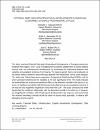External Debt and Infrastructural Developments in Emerging Economies: Evidence from Nigeria, 1979-2019
التاريخ
2022-06-21البيانات الوصفية
عرض كامل للتسجيلةالملخص
The Study examined External Debt and Infrastructural Developments in Emerging economies: Evidence from Nigeria, 1979 – 2019. The objective is to examine whether there is a nexus between external debt and infrastructural developments by evaluating the relationship between both variables using available evidences from Nigeria. The balance-growth theory was employed and the sample period covered 40 years with data obtained from World Bank Group online database. The study used Robust least square regression, Autogressive Distributed lag (ARDL), and the Error Correction Model to test the variables at the 0.05 significance level. The results indicates that external debt has positive and significant effect on the dependent variable in the short-run, but shows no significant correlation with infrastructural developments proxy by capital investments in the long-run and negatively insignificant nexus with real GDP. This study concludes that while foreign debt has significant relationship with the dependent variable in the short-run, it however, has insignificant correlation with infrastructural development in the long-run; and recommends that external borrowing contracts should be based on sound credit appraisals, to finance self-liquidating priority projects.
المجموعات
- 2022 - Volume 25 - Issue 1 [4 items ]


